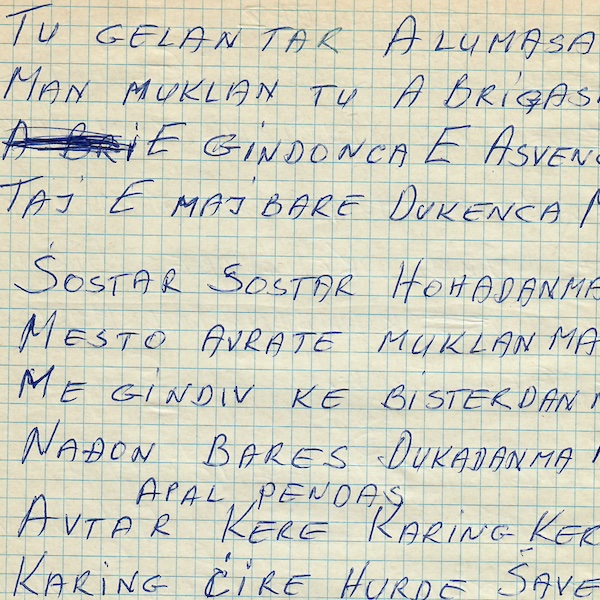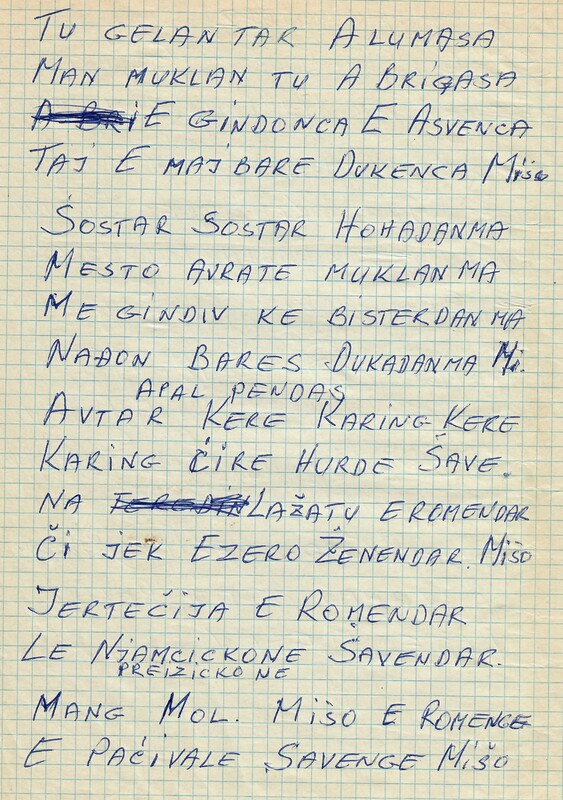
Tu gelan-tar a lumasa
Content
Recordings
In the song Tu gelan-tar a lumasa a woman speaks of being abandoned by her husband. In the end, she manages to get her husband to come back to her and be accepted back into the community.
Musical transcription based on the booklet accompanying the CD Amare gila - Unsere Lieder / Our Songs
Tu gelan-tar a lumasa is one of the neve gila, the new songs. Interestingly, the song is told from the perspective of a woman. In the traditional, slow songs, men are usually abandoned by women. The woman's infidelity is a theme that is often sung about. In Tu gelan-tar a lumasa , on the other hand, the woman is abandoned by her husband, which is a new, individual form of expression.
Ethnomusicologist Ursula Hemetek explains how the song came about:

"Tu gelan-tar a lumasa is a new song. Such creations often have echoes of pop songs or South American melodies, but they are rarely consciously used as a whole and translated into Romani language. Individual melody parts or longer passages remained in Ruža and Mišo's memory, they liked them, and a new song was created from them. I witnessed the creation of several such songs myself. It is an extremely creative process and Ruža and her husband complement each other wonderfully. One of them hums a melody, Mišo starts to play it on the guitar and makes up lyrics. It doesn't take long, and the first verse is finished. Mišo usually writes down the finished text, Ruža reads it through a few times and changes it according to her dialect. The two of them often discuss the lyrics for a long time. The melody does not have to be written down because Ruža has an extraordinary musical memory. Tu gelan-tar a lumasa was written about 20 years ago [around 1974] in a creative collaboration between Ruža and Mišo, with unmistakable echoes of a popular Hungarian melody. This song is also said to be based on a true event."
Source:
- Amare gila - Unsere Lieder – Our Songs. Ruža Nikolić-Lakatos et al., a documentation of Lovara song culture in Austria. CD with booklet. In the series: Sound documents of folk music in Austria Vol.4, March 1994, reissue 1998.
On their CD Ruzsa Shej, Ruža Nikolić-Lakatos and The Gypsy Family published this version with the title Tu gelantar.
Commentary
(GERMAN ONLY) Ruža Nikolić-Lakatos übersetzt und erklärt der Ethnomusikologin Ursula Hemtek den Text zu Tu gelan-tar a lumasa. Mišo Nikolić übt im Hintergrund die Gitarrenbegleitung.
(GERMAN ONLY) Ursula Hemetek presents Tu gelan-tar a lumasa on the occasion of a performance by Ruža Nikolić-Lakatos and Mišo Nikolić at the Interkulttheater in 1993. She translates the text and emphasizes that the song is about a special relationship between man and woman.
Lyrics
Stanza 1
| Jaj de tu gelan-tar a lumasa, | You have gone into the world |
| man muklan tu a brigasa, | and left me behind in sorrow, |
| jaj de gindonenca e asvenca | with heavy thoughts and tears |
| jaj de taj e maj bare dukhenca, mo hej. | and with great pain. |
Stanza 2
| Jaj de, sostar, sostar xoxadan ma? | Why, why did you betray me? |
| Misto avra te muklan ma. | You left me for someone else. |
| Jaj de me gindij ke bisterdan ma | I believe that you have forgotten me, |
| jaj de nagjon phares dukhadan ma, mo hej. | you have hurt me very much. |
Stanza 3
| Apal phendas: | Again, she said: |
| Av-tar khere, karing khere | Come back home, |
| jaj de na laža tu le Romendar | don't be embarrassed in front of the [other] Roma. |
| jaj de na teredin le Romenca | Don't worry about what the Roma will say, |
| jaj de numaj tje xurde šavenca, mo hej. | Just think of your little children. |
Stanza 4
| Jaj de engedelmo e Romendar | I ask the Roma, |
| jaj de le njamcickone šavendar: | the Austrian Romani boys for permission: |
| Jaj de mang mol, Mišo, e Romenge, | Order wine, Mišo, for the Roma, |
| jaj de le patjivale šavenge, mo hej. | for the honorable boys. |
| Apal inke jokhar: | And once again: |
| Jaj de mang mol Mišo e Romenge, | Order wine, Mišo, for the Roma, |
| jaj de le patjivale šavenge, mo hej. | for the honorable boys. |
Manuscript by Mišo Nikolić
Literature
- Hemetek, Ursula: Comparison of Žo-tar mange žo-tar and Tu gelan tar a lumasa, a slow song and a new song In: Amare gila - Unsere Lieder – Our Songs. Ruža Nikolić-Lakatos u.a., eine Dokumentation der Lovaraliedkultur in Österreich. CD mit Begleitheft. In der Reihe: Tondokumente zur Volksmusik in Österreich Vol.4, März 1994, Neuauflage 1998. PDF
Zitierempfehlung anzeigen
Bitte zitieren Sie diese Seite wie folgt:
Music and Minorities Research Center, "Tu gelan-tar a lumasa", Ružake gila, zuletzt besucht am Loading date..., doi.org/10.21939/66hj-an12



